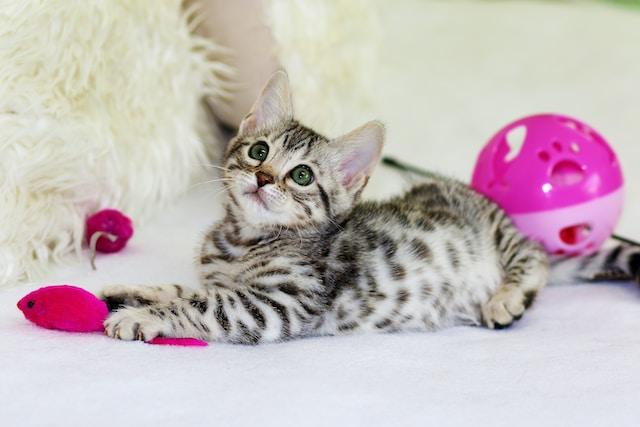Kittens may not speak, but they communicate with you in various ways. By understanding the kitten behaviors such as body language and listening to the sounds they make can tell you a lot about what they want from you.
Kitten’s Body Language
Your kitten will give various behavioral signals using its body language to express its mood. By understanding each change in behavior, you can learn to provide what they need, whether it’s space, playtime, or food.
Calm
A calm posture is the initial stance of your kitten in a neutral state that can change into various other body languages. You need to know how your kitten behaviors when friendly to recognize even subtle changes.
Interested
If your kitten is interested in something, they will show it through their body language. It’s not a specific reaction to something negative but simply indicates your kitten’s interest in a particular situation/object.
If your kitten shows interest in a toy, it’s a good idea to involve them in play. Besides providing mental and physical stimulation, it’s an excellent opportunity to bond with them.
Relaxed
Relaxed kitten behaviors is a good indication that they feel comfortable, calm, or safe in a specific situation.
Anxious
You should recognize signs of anxiety or stress in your kitten. If they appear anxious, try to eliminate the cause and provide space for your kitten. Make sure your kitten can always escape from a situation and access higher spaces to calm themselves.
Fearful
There are some body language cues your kitten might display if they are afraid. One posture indicating a fearful cat is an arched back with raised fur on the tail.
The purpose of this behavior is often to make themselves look larger or more formidable to prevent potential threats. In a worried kitten, the cause of concern should be removed to help your kitten relax.
Supporting Good kitten behaviors

Regarding the implementation of positive behavior, the key is consistency. If your kitten receives mixed signals from others at home, it can lead to confusion and more frequent adoption of undesirable behavior.
Reinforcing kitten behaviors
Another crucial note is to focus on positive behavior. Your kitten primarily learns by making connections between specific actions (from themselves or other cats) and their outcomes. If your kitten runs away from loud noises or newcomers in the home.
For example, avoid picking them up or hugging them as it may reinforce their anxiety. Instead, calmly and gently engage your kitten with toys to encourage them to come out of hiding.
This way, your kitten will begin to realize there’s no reason to be upset and become more comfortable in such situations over time.
Explanation of Kitten Behavior
Your kitten’s behavior may seem unusual, but there is often a reason behind it. Find some explanations for your kitten’s behavior below.
In the early months of their lives, kittens may scratch to remove the outer layer of their claws and grow new ones. Scratching is also a natural way for your kitten to mark its territory.
To prevent them from scratching your furniture, provide suitable alternatives like a scratching post or mat. Since cats scratch to mark their territory, place scratching pads or posts in areas where they usually scratch.
A common mistake made by pet owners is playing with kittens using their hands. Doing so may unintentionally reinforce the idea that it’s okay for your kitten to bite softly, bite hard, or scratch your hands.
The best way to prevent this kitten behavior is to offer alternative toys to your kitten during play.
Reasons why kittens bite
Kittens may bite for various reasons, including play, exploration, or teething. If your kitten bites, provide appropriate toys for them to bite and chew on. If they bite your hand or fingers, redirect them to a suitable toy.
Avoiding the litter box could have several causes. First, consider whether the litter box is in an appropriate position, far enough from their food bowl, and in an easily accessible yet secluded location.
If your kitten shares the box with other cats, stress or intimidation may cause them to avoid using it. It is recommended to have at least one litter box per cat in the house, plus one spare.
Similar to biting, your kitten may avoid the litter box due to anxiety or disruptions in their routine. Consider whether your kitten has experienced recent changes in their routine or social situation.
If you have ruled out all the above possible causes, it could also be a sign of illness. If you’re unsure about your kitten’s health or behavior, consult your veterinarian.
Carefully observing your kitten behaviors and identifying any abnormalities can be a significant indication of changes in their health. Learn more about how to maintain your kitten’s health and when they might need a visit to the veterinarian.

